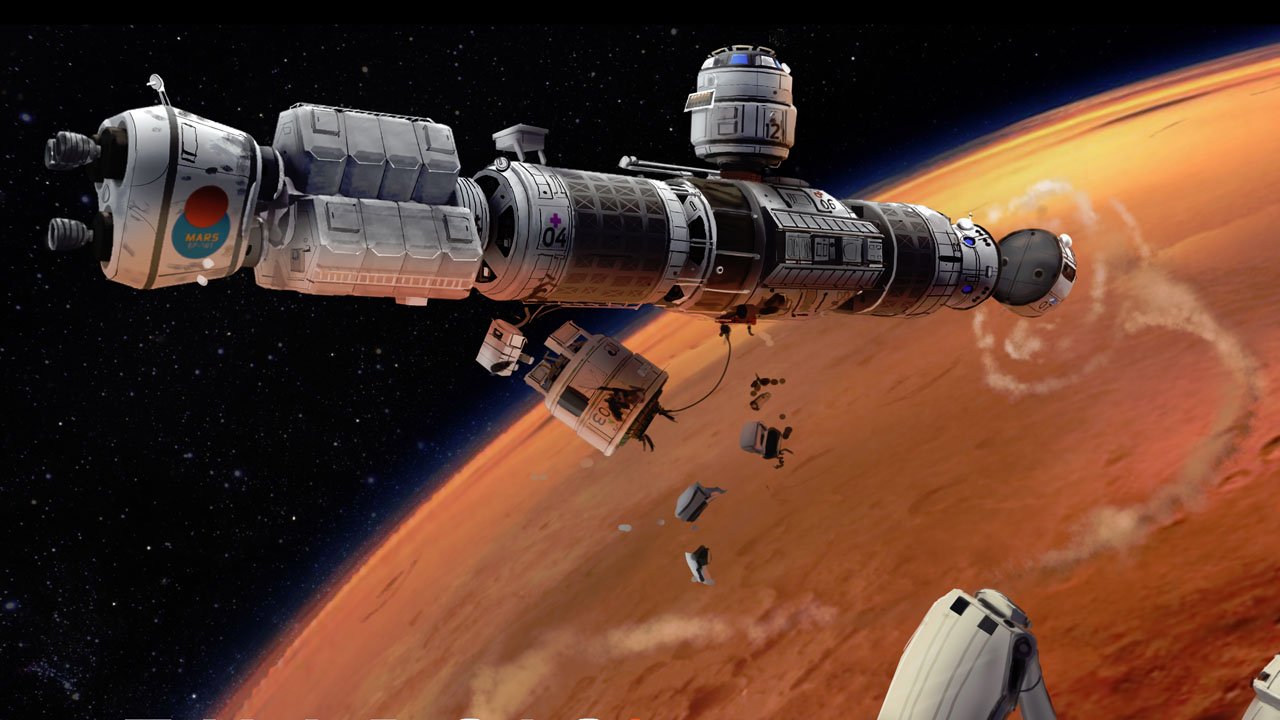In the words of Wernher von Braun, one of the fathers of modern space flight, “space staggers the imagination with its endless immensity and majestic, awesome wonders.” The allure of outer space is undeniable; its vast, empty beauty calling out to humans around the globe. Yet for all its beauty, the attraction of space is tempered by its deadliness. Given enough time, space will destroy its explorers. Even the most finely tuned spacecraft are subject to small errors, and in the void of space the smallest errors can end in tragedy.
Therein lies the basic premise of Tharsis, a new strategy game from developer Choice Provisions. A group of astronauts must struggle to survive aboard the faulty spacecraft Iktomi. The ship is on the final leg of its long journey to Mars, carrying the first manned expedition to the red planet, when a cluster of meteoroids cripple the ship and kill two of the crew. With ten weeks until the ship reaches Mars, the mission parameters change drastically.
Your new mission: survive.
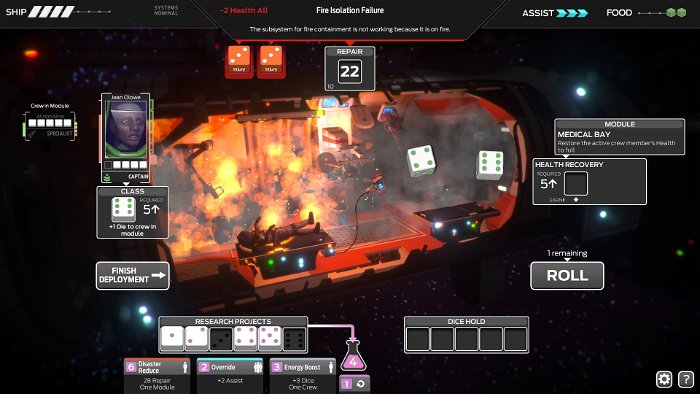
Tharsis’ gameplay is very similar to that of a board game, with every action determined by a roll of the dice. Players take control of the four remaining crew members and guide them through the modules of the ship, rolling their dice and choosing how to spend the points. Points can be allocated in a few ways – repairs to the ship, specific actions in each module, character bonuses, or research. Aside from repairs, most actions require either a number higher than five or a pair to be rolled, so most of the time even the best strategies begin to fall apart as soon as you roll the dice.
Each of the crew members has a random number of dice to start, and that number decreases every turn. The dice can only be replenished by eating or using specific bonuses, making them your most precious resource. The characters also have a health bar and a stress bar that need to be managed to keep everyone working. As the crew goes from module to module trying to fix an ever-increasing number of problems, new dangers will present themselves. For example, a module might be in need of major repairs, but for every six the player rolls, their crew member will be injured.
Each turn in the game is about micromanagement, trying to do too much with limited rolls. However, even a player doing everything right can lose the game almost immediately. The random nature of the dice will work against you on every single playthrough. It’s because of this that Tharsis is brutally difficult to complete. In over forty playthroughs, I made it to the final round three times and only successfully completed the game once. This is a game that will frustrate you to no end, as the dice always seem controlled by a malevolent deity intent on your ship’s destruction. As such, you will always be forced to make difficult decisions – sacrificing a crew member, resorting to cannibalism to keep your crew fed and working, etc.
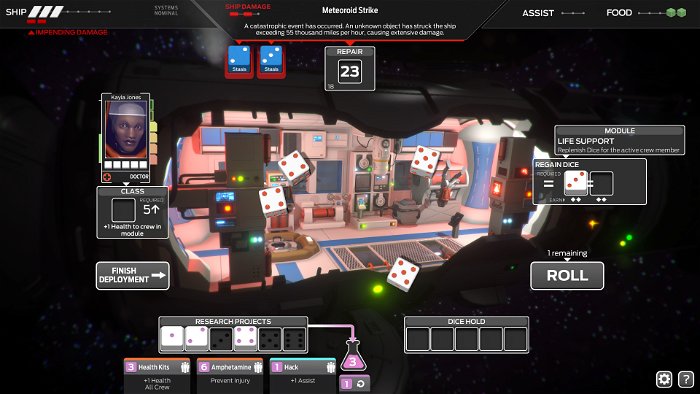
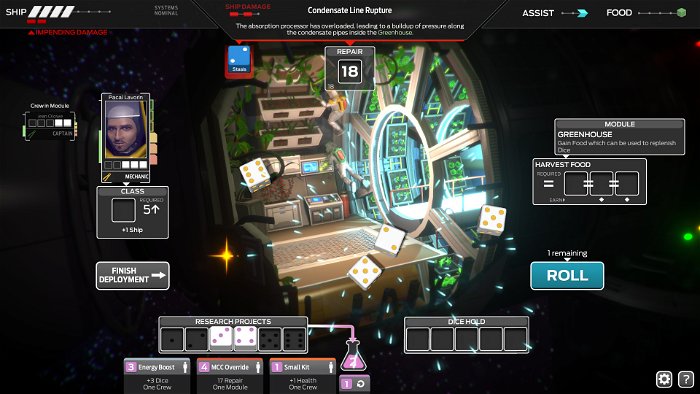
The random nature of the game is consistently frustrating, but it does allow for some shocking moments of triumph as well. Defying the odds and somehow keeping the Iktomi together for another week feels even better because of the game’s difficulty. It’s not enough to fully redeem the game’s frustrating design, but it helps to make it far more tolerable.
There’s not much more to the game once you’ve survived and landed on Mars. There is a hard mode, as well as a few new crew members that can be unlocked, but overall there’s no real incentive to keep playing. Every playthrough is different, but most will end the same. Finishing the game is actually a bit of a letdown – the brief story feels pointless and once you’ve triumphed there’s nothing driving you forward into new playthroughs. Tharsis does include leaderboards, but it’s hard to imagine that will encourage many players to seek a higher score.
Graphically, the game is more functional than impressive. Each of the ship’s modules have been lovingly designed, but after the first couple of rounds there’s not going to be any reason to look around the room. The same can be said for the cutscenes that drive the story. The scenes look like animated oil paintings, which were the high point of the game’s aesthetic for me. Unfortunately, after the first few rounds, you will be skipping through these to try and move forward. Finally, the character models left much to be desired. Each member of your crew looks fairly similar and all share a limited number of facial expressions – mostly aghast/horrified when your crew is forced to resort to cannibalism.
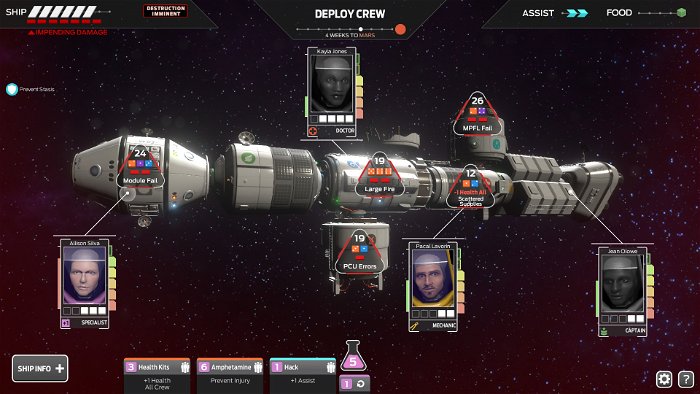
Surprisingly, it’s not the gameplay or the design that I found to be most remarkable, but the soundtrack. It never swells up above background music, but the electronic songs shift from dark and moody to surprisingly upbeat tracks. The songs are catchy and make sitting on the game over screen a little more bearable.
Tharsis is an enjoyable game to start, but the frustrations and random nature of the game quickly eliminate the fun. It works exactly as it should, but hinging a player’s victory on a random roll of the dice will likely discourage all but the most dedicated board game enthusiasts. This is a game that requires patience and dedication to succeed, but the victory itself is made hollow by the game’s narrative and limited replay value.
